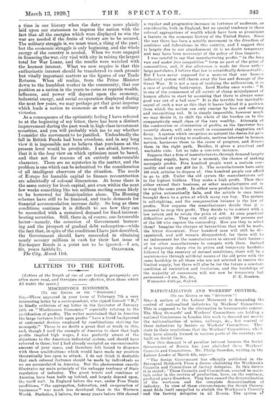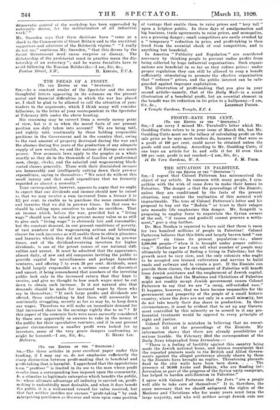NATIONALIZATION AND WORKERS' CONTROL. (To THE EDITOR OF THE "
SPECTATOR.") Sia,s—A section of the Labour Movement is demanding the control of nationalized industries by Workers' Committees. This is supposed to be the alternative to bureaucratic control. The Shop Stewards' and Workers' Committees are holding a national Conference in London this week to demand not merely the nationalization of mines, railways, &c., but control of these industries by Soviets or Workers' Committees. They state in their resolutions that the Workers' Committees, which they have already formed in various parts of the country, are built on Soviet lines.
Now this demand is of peculiar interest because the Soviet Government of Russia has just abolished these Workers' Councils and Committees. Mr. Philip Snowden, writing in the Labour Leader of March 4th, says:—
" The Soviet Government has officially published in the Petrograd Bolshevik Press a decree abolishing the Workmen's Councils and Committees of factory delegates. In this decree it is stated : These Councils and Committees, created to main- tain order in the centres of production, have, on the contrary, produced grave disorders. They have caused the demoralization of the workmen and the complete demoralization of industry. In view of these circumstances the Soviet Govern- ment finds itself compelled to abolish the Workmen's Councils and the factory delegates in all Russia. The system of
democratic control of the workshop has been superseded by autocratic decree, for the militarization of all industrial work.' " Mr. Snowden says that these decisions have " come as a shock to the Communists of Great Britain and to the uncritical supporters and admirers of the Bolshevik regime." "I really do not see," continues Mr. Snowden, " that this decree by the Soviet Government need cause surprise or dismay. The dictatorship of the proletariat must in practice mean the dic- tatorship of an autocracy "; and he warns Socialists here to avoid following the Russian Bolsheviks.—I am, Sir, &c.,











































 Previous page
Previous page